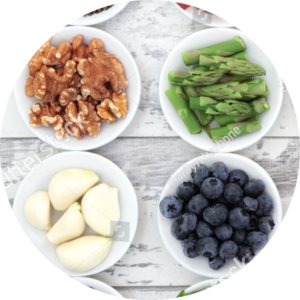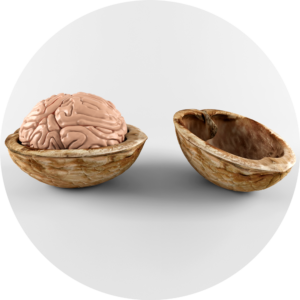Food and Gut Brain Health
“ABC: Always be Counting! Not your calories but the number of fruits and vegetables you have. Consuming at least 20-30 diverse fruits and vegetables each week is key”
— ARPANA CHURCH, PHD
If instead of a rabbit hole, Alice, went down a big journey inside the gut and all the way up to the brain, what do you think she would have found? Perhaps some blueberries boosting concentration or walnuts reversing age-related cognitive decline or maybe even the bad-breadth king, garlic that is actually the gut and brain’s friend.


We fuel our gut and our brain with the food we eat.
The foods that we eat are also closely linked to our gut health which in turn influences the health of our brain. After the brain, the gut microbes contain the largest number of neurons in the body that are in constant communication with the brain through the brain-gut axis. There is a connection between the food we eat, the types of bacteria produced in our gut, and how these bacteria produce compounds that communicate with the brain. It is the presence of good versus the bad bacteria that affects our brain’s functions.
In other words, the quality, the type, and the amounts of food we consume impact how we function, stay healthy, think, make decisions, solve problems, and our overall mood.
This might seem like a stretch … but hear this out. We have heard about certain foods increasing our metabolism or helping us reduce weight.
Our gut and our brain are always listening and responding to the composition of our diets. Cutting-edge research studies have shown that the typical Western diet can increase depression by up to 35% when compared to the Mediterranean diet and the Japanese diet. Western diets are filled with many weapons of mass destruction. They are high in processed meats, have few vegetables and fiber, and contain a lot of processed and refined oils, sugars, chemical additives, and preservatives that are secretly damaging brain function. The good news is that it is never too late to control how our gut and brain perform. “the good news is that you are not stuck with the bad bugs in your gut or with the brain you have, you can make it better”.
Exiting scientific evidence from the new, emerging field of Nutritional Psychiatry suggests a promising link between the consumption of healthy, whole foods and nutrients to improve our mental well-being and overall health. Each of us consumes an average of 3 pounds of food per day, of which the brain uses about 20% of our daily calories. Putting this math into perspective, that’s about one thousand pounds of food per year, meaning that we will consume about eighty thousand pounds of food in our lifetime. In these eight thousands pounds of food lies our greatest opportunity to manifest a healthier and happier gut and brain.


Feeding our gut and brain the right fuel can go a long way when it comes to improving the health of our body and brain.
Clearly food provides more than nutrients and energy for the brain and body. Making healthier choices in your diet benefits your waistline, helps lift your mood, and provides a long-lasting increase in energy and focus. This has huge implications for the future of health and how we can use food as medicine to ward off disease and even prevent it.
The trick to a healthier and happier brain is about to get much simpler. Grounded in fascinating science, patented probiotic blends, clinical research, practical nutritional recommendations, and delicious, gut-brain-healthy recipes, ABioME is the go-to guide to optimizing your gut-brain health with probiotics and food.
As we let Alice continue her journey of discovery, we need to make every bite count.